|
Mar
27
2023
|
|
Posted 2 years 330 days ago ago by Admin
|
|
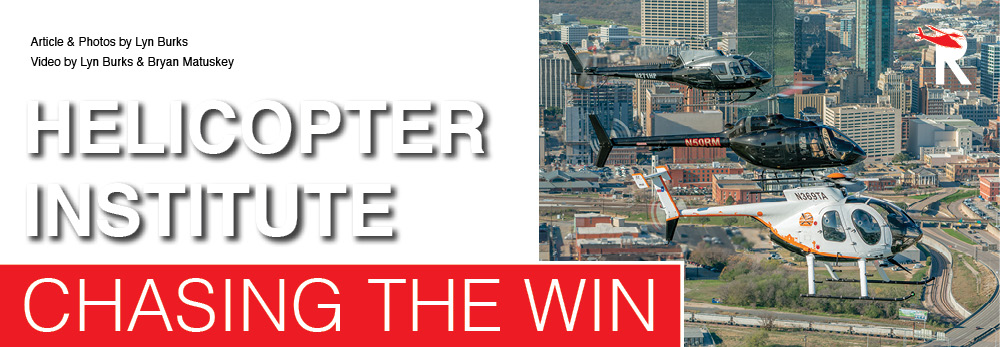
Randy Rowles, the president of Helicopter Institute, has been presenting at the HeliSuccess Career Development Seminar for 14 years now. In the context of career planning to become a helicopter pilot, Rowles ends every presentation with the line, “Having a Dream is Not a Plan." With respect to starting a niche helicopter training company over a decade ago, he’s been planning his dream ever since.
Located at the Fort Worth, Texas, Meacham International Airport (FTW), Helicopter Institute was established in 2009 by Randy and Samantha Rowles in an effort to provide helicopter operators and pilots an alternative to OEM/factory aircraft transition courses as well as advanced training.
“Helicopter Institute is an advanced training organization and our role in the industry is to improve helicopter safety one pilot at a time,” said Randy Rowles, president of Helicopter Institute.
Over the last 14 years, the once-small helicopter operator has grown into a formidable niche training provider. The company has succeeded by its relentless desire to make the industry safer through training, and its ambitious efforts to chase big wins as it relates to business contracts like its current effort to win a 10-year training contract with the U.S. Air Force. (We’ll get to that later in this article.)
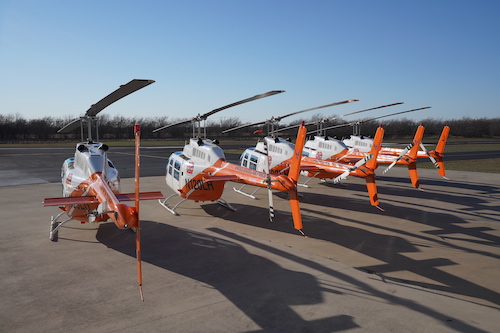
Niche Training Market
At the core of the Helicopter Institute’s business model is to be an OEM “alternative” training solution for helicopter operators across a variety of mission profiles and aircraft platforms. Often, when an operator purchases or operates a specific make/model, the operator likely uses the OEM’s training services for initial and recurrent pilot training. Early on, Rowles understood that, for a variety of reasons (cost, logistics, course availability, etc.), there would be demand from operators for high-quality pilot courses from a non-OEM training organization.
The keys to becoming an alternative OEM training provider goes well beyond addressing issues of cost, logistics, and availability. There must be credibility and recognition—backed up by experience.
Will insurance companies recognize non-OEM provided training courses? The answer to that question is yes, as the training programs are insurance industry accepted, and Helicopter Institute is one of the few training providers approved to accept USAIG Safety Bucks.
Regarding the credibility of the training programs, Rowles has built the courses on decades of experience in the training industry. In addition to being an FAA designated pilot examiner for 29 years (notice that: nearly three decades!) Rowles was also the founder of a well known primary helicopter training academy, Palm Beach Helicopters, back in 2001. Palm Beach was one of the first primary helicopter training companies to effectively incorporate light-helicopter simulator training into primary training curricula.
Additionally, Rowles has experience at the OEM level as he was an instructor pilot at several prestigious training organizations such as the Bell Training Academy and Flight Safety International. Rowles’s unique background and experience has given him perfect insight into how to build world class training programs that everyday operators can easily access and afford.
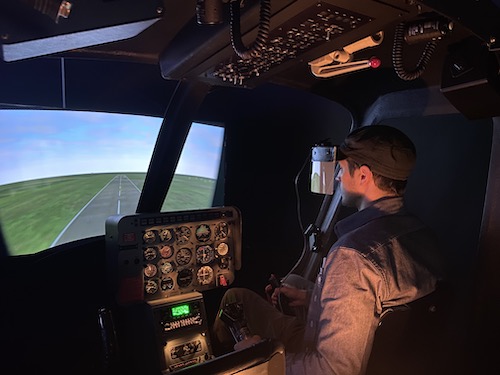
Types of Training
OEM-Alternative Training
Platform Course Offerings
Bell 407
Bell 206B/L
Bell 505
Airbus AS350
MD 500E
Because of the company’s efforts, reputation and connections throughout the industry, Helicopter Institute provides training to an extremely diverse set of customers from several sectors, which include primary and advanced training, law enforcement (local, state, federal), air ambulance, offshore oil support, and utility. Although the client list is long, one gets a feel for the quality of customers attracted to Helicopter Institutes services with names like DEA, Embry-Riddle Aeronautical University, Tennessee Valley Authority, Federal Aviation Administration, Oklahoma State Police, and PHI to name a few.
Location, Location, Location
It’s a common refrain heard about real estate: “location, location, location,” and for helicopter training, that mantra applies as well. As stated earlier, the company’s primary base is located at Meacham International Airport (FTW) in Fort Worth, Texas—a strategic location. The majority of Helicopter Institute’s flight operations are conducted at FTW and that saves time and money by reducing the need to ferry to other training locations.
“We are located in the middle of the United States, so it’s easy to travel here, and this area is the Mecca of Aviation, specifically for helicopters with two major OEMs located in our backyard. There are a lot of different types of training areas with respect to airspace and terrain, which makes this area a great place for helicopter training,” said Scott Steele, Helicopter Institute’s director of training. Still, many customers desire to receive training in their own aircraft in their home flying environment and Helicopter Institute can accommodate that request as well.
Advanced Training À La Carte
The diversity of the Helicopter Institute fleet is unmatched within the training industry. Their fleet of aircraft supporting OEM-alternative transition courses include the Bell 505, Bell 407, Bell 206B/L, Airbus AS350B2, MD500E, and MD600N. In addition to their in-house fleet of training aircraft, the company offers off-site training in the Bell 205, 212, 412, 230, 427, 429, 430, AS350 (all series), MD530, and many others.
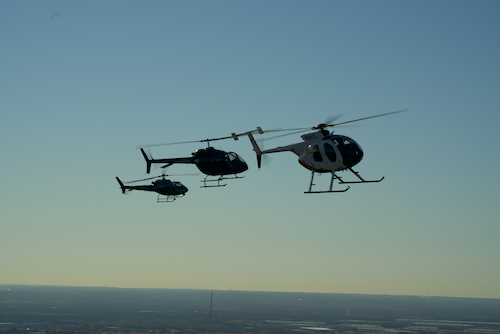
Looking at even a short list of customers, one begins to realize that every client has distinctly different mission profiles, which means that training has to be tailored to each individual operator. Therein lies a key strength of the company as a training organization—it combines experience and flexibility. “Our goal is to provide a single training contract to an operator that covers a wide variety of aircraft and mission profiles. This saves the customer time and money” said Rowles.
Whether an organization desires to be trained in their own aircraft at their own location, or whether they wish to travel to the Helicopter Institute location and fly its aircraft, the organization has a network of training experts at their disposal to tailor and implement a program for the operator’s specific needs. Need Part 135 NVG training and checking in an AS350 for air ambulance or law enforcement ops? No problem. How about long-line training in an MD 500? The answer will be “your aircraft or ours?” Or what about initial pilot transition training in the Bell 505? No worries, they’ve got you covered.
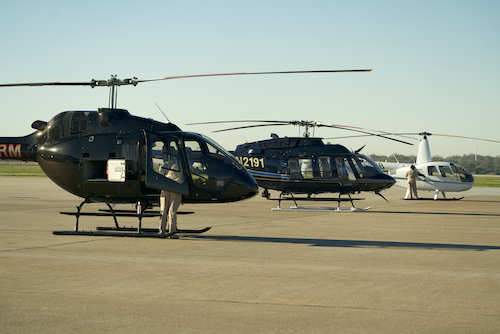
Advanced Training Course Offerings
Firefighting
Longline
Mountain Flying
Law Enforcement-Tactical Flight Officer Course
Night Vision Goggle Initial / Recurrent
Of course, let's not forget primary training for new pilots. The Helicopter Institute offers traditional FAA certification courses (Private through CFII) in the Robinson R44, R22, and Schweizer 300. As of the writing of this article, Helicopter Institute was selected as the OEM/factory training provider for RSG Schweizer’s newly introduced Schweizer 300 line of aircraft.
Additionally, Helicopter Institute has an in-house “simulation lab” which boasts an impressive array of flight simulation solutions to include the Bell 427, Bell 407, Bell 206B/L, AS350B2 and Robinson R44/22. Helicopter Institute is the only recognized training provider of a simulation solution for the Bell 427.
Helicopter Institute is also one of the first U.S. civil training companies to explore virtual reality (VR) as a training solution for helicopters. In partnership with HeliMod out of California and Embry-Riddle Aeronautical University, a virtual reality helicopter simulator was put into use in order to develop data points on the training outcomes when VR is used in helicopter training.
“I firmly believe in simulation and the Helicopter Institute as an organization embraces simulation not only by use of our sims in the lab, but also in the cockpit of our aircraft,” said Rowles. Take for example, one of the company’s most recent partnerships, ICARUS, the developer of the ICARUS Smart View Limiting Device.
Patented in 2016, the ICARUS device is a proven training aid that teaches aircrews how to survive sudden entry into bad weather or visual obscurations such as dust, snow and smoke. Aviators who enter clouds without warning can become spatially disoriented, making it nearly impossible to tell which way is up or down. Tragically, 86% of these spatial disorientation accidents are fatal.
“The ICARUS Smart View Limiting Device is compact, but creates a whole new simulated perspective by bringing the decision-making process of helicopter instrument flight, or inadvertent IMC into the actual cockpit,” says Rowles.
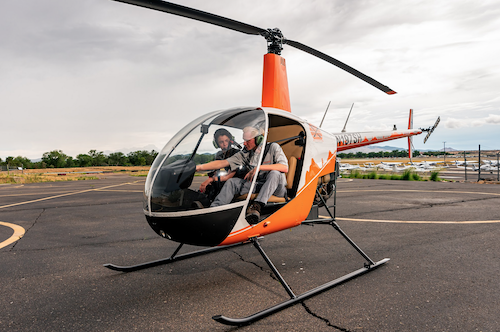
The company is not just limited to primary training at its Texas location, there’s also an academic connection. In February, 2022, Embry-Riddle Aeronautical University selected Helicopter Institute as the sole provider of the Helicopter Flight Training Program to students at the university’s Prescott, Arizona, campus.
“There is an old adage at Embry-Riddle: ‘The sky’s the limit,’ and when two great organizations come together, this holds true,” said Timothy B. Holt, dean of Embry-Riddle’s Prescott Campus College of Aviation at the time of Helicopter Institutes selection. “We are extremely fortunate to be partnering with Helicopter Institute and sharing that sky. The future for our students is unlimited!”
U.S. Air Force Contract
Traditionally, U.S. military organizations rely on themselves to provide primary and advanced helicopter pilot training. Until now.
Recently the U.S. Air Force (USAF) put out a Request for Proposal (RFP) titled “Introductory Flight Training - Rotary Wing (IFT-R) Effort.” The contract would be a 10-year program in which the USAF will send its rotary-wing pilot candidates to a civil training organization for introductory training (think private pilot) prior to attending their USAF rotary-wing pilot training.
The idea behind USAF pilot candidates getting introductory training before main military training is that it not only will save money on training costs on a per-pilot basis, but it will also allow a pilot to have better understanding of all facets of rotor-wing flight which will make the training transition into more complex aircraft and missions more seamless for pilots, thereby improving training outcomes and producing safer pilots.
Steele has real insight as to what the USAF is looking for, and what military training looks like. As a retired Army helicopter pilot, he spent a good portion of his career at Fort Rucker directing rotary-wing pilot training standards and activities at the Brigade level.
“Helicopter Institute is primed for this type of contract because this is what we do every day, all day,” said Steele referring to their experience training pilots in FAA Part 141 training programs.
Rowles echoed the same sentiment when he said, “Considering the USAF RFP, we believe the contract to be low hanging fruit for our organization. We are a helicopter training provider and based on the requirement set forth by the USAF in the RFP, Helicopter Institute is a commercial off-the-shelf solution.”
There’s no doubt that Helicopter Institute has the facilities (aircraft plus simulators), the experience and the personnel to provide world-class training that would produce safe, competent entry-level pilots who are able to transition into formal USAF rotary-wing training.
“We understand that the USAF places a high value on safety; here at Helicopter Institute our motto is ‘improve helicopter safety one pilot at a time,’ and we take that seriously,” said Steele. “The USAF will receive a safe pilot from Helicopter Institute trained to a standard that would allow them to pass an FAA private-pilot checkride.”
People and Partnerships
With a hard-working team of 25 people and 23 helicopters at its disposal, Rowles is quick to point out that none of the company’s business success or growth could occur without the dedication of its people and the strength of its industry-wide partnerships.
The company considers its instructor pool to be experts in their field at delivering unparalleled quality to each and every pilot trained. Additionally, the company’s instructional expertise has been recognized by the Helicopter Association International (HAI) as three Helicopter Institute instructors are recipients of the prestigious W.A. "Dub" Blessing Flight Instructor of the Year Award.
“I can’t mention all the partners who contribute to the success of the Helicopter Institute because there are many. It’s really about the relationships we have in the industry and we appreciate each and every one.” said Rowles. “If you need an example, I can point to Aerodynamix, a leader in NVG cockpit solutions. Aerodynamix has helped us grow our night vision goggle training business by providing NVG modifications to many of our helicopters with high-quality cockpits, which are ready to go right to work with very low maintenance.”
Speaking of maintenance, none of this flight training occurs without a solid maintenance program in place to keep the rotors turning across the fleet. Helicopter Institute employs dedicated in-house maintenance staff to maintain their fleet. Each mechanic holds FAA issued Airframe and Powerplant certificates working side-by-side with the director of maintenance, Austin Rowles.. Some of the mechanics also hold Pilot Certificates with Helicopter ratings, and the company supports each staff member to continue their aviation education.
Chasing with Passion
The dictionary defines the word “chase” as: “to follow or devote one's attention with the hope of attracting, winning, etc.”
For the last 13 years, Helicopter Institute’s success and its growth have been born out of passion and chase. Passion to produce a better, safer helicopter pilot, plus the chase of a new challenge to grow as a company. Then there is the ultimate satisfaction of “winning” when those efforts are recognized every time a new client honors them with the sacred trust of training its pilots. I have a feeling that the Helicopter Institute will keep chasing its wins one client at a time for the years to come.
READ MORE ROTOR PRO JAN/FEB ISSUE
READ MORE ROTOR PRO: https://justhelicopters.com/Magazine
WATCH ROTOR PRO YOUTUBE CHANNEL: https://buff.ly/3Md0T3y
You can also find us on
Instagram - https://www.instagram.com/rotorpro1
Facebook - https://www.facebook.com/rotorpro1
Twitter - https://twitter.com/justhelicopters
LinkedIn - https://www.linkedin.com/company/rotorpro1